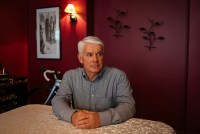Latest Morning Briefing Stories
Listen: With Abortion Rights on the Ballot in Michigan, Women Tell Their Stories
Women who need abortion care come to Michigan from surrounding states that already have banned the procedure. A clinic in suburban Detroit allowed a reporter to interview patients, doctors, and nurses to understand what is at stake as voters decide whether to guarantee abortion access in the Michigan Constitution.
Post-‘Roe,’ Contraceptive Failures Carry Bigger Stakes
Science Friday and KHN ran the numbers on birth control failure. Depending on the contraception method, typical-use error rates can add up to hundreds of thousands of unplanned pregnancies each year.
Centene Showers Politicians With Millions as It Courts Contracts and Settles Overbilling Allegations
Centene, the largest Medicaid managed-care company in the U.S., has thrown more than $26.9 million at political campaigns across the country since 2015, especially focused on states where it is wooing Medicaid contracts and settling accusations that it overbilled taxpayers. Among its tactics: Centene is skirting contribution limits by giving to candidates through its many subsidiaries.
KHN’s ‘What the Health?’: ACA Open Enrollment Without the Drama
The Affordable Care Act’s 10th annual open-enrollment period began Nov. 1 and runs through Jan. 15, 2023, in most states. But for the first time, the health law seems to be enrolling Americans with far less controversy than in previous years. Meanwhile, as Election Day approaches, Democrats are focusing on GOP efforts to cut Social Security and Medicare. Joanne Kenen of the Johns Hopkins Bloomberg School of Public Health and Politico, Tami Luhby of CNN, and Julie Appleby of KHN join KHN’s Julie Rovner to discuss these topics and more. Also this week, Rovner interviews KHN’s Arthur Allen, who wrote the latest KNH-NPR Bill of the Month, about an old but still very expensive cancer drug.
Knoxville’s Black Community Endured Deeply Rooted Racism. Now There Is Medical Debt.
Despite the end of Jim Crow segregation, its legacy lives on in medical debt that disproportionately burdens Black communities.
KHN’s ‘What the Health?’: Voters Will Get Their Say on Multiple Health Issues
Abortion isn’t the only health issue voters will be asked to decide in state ballot questions next month. Proposals about medical debt, Medicaid expansion, and whether health care should be a right are on ballots in various states. Meanwhile, the latest lawsuit challenging the Affordable Care Act has expanded to cover all preventive care. Alice Miranda Ollstein of Politico, Jessie Hellmann of CQ Roll Call, and Victoria Knight of Axios join KHN’s Julie Rovner to discuss these topics and more.
$38,398 for a Single Shot of a Very Old Cancer Drug
Lupron, a drug patented half a century ago, treats advanced prostate cancer. It’s sold to physicians for $260 in the U.K. and administered at no charge. Why are U.S. hospitals — which may pay nearly as little for the drug — charging so much more to administer it?
How Private Equity Is Investing in Health Care: A Video Primer
Investors are putting money into everything from emergency room obstetrics units and dermatology practices to nursing homes and hospice care — from cradle to grave.
Listen: How Does Human Composting Work?
California Healthline’s Bernard J. Wolfson went on the air to explain a new California law that will allow people to have their bodies reduced to compost after death, an alternative to the traditional-but-toxic methods of cremation and burial.
KHN’s ‘What the Health?’: Biden Hits the Road to Sell Democrats’ Record
With the midterm elections rapidly approaching, President Joe Biden has taken to the road to convince voters that he and congressional Democrats have delivered for them during two years in power. Among the health issues highlighted by the administration this week are pandemic preparedness and the availability of over-the-counter hearing aids. The president also promised to sign a bill codifying the abortion protections of Roe v. Wade if Democrats maintain control of the House and Senate — even though it’s a long shot that there will be enough votes for that. Sarah Karlin-Smith of the Pink Sheet, Sandhya Raman of CQ Roll Call, and Mary Agnes Carey of KHN join KHN’s Julie Rovner to discuss these topics and more. Plus, for extra credit, the panelists recommend their favorite health policy stories of the week they think you should read, too.
Family Caregivers Find Support on #dementia TikTok
The TikTok hashtag “dementia” has billions of views. Caregivers of people with Alzheimer’s and other dementias have been using the site to swap tips and share the burdens of life with dementia.
Listen: Why Childbirth Is So Dangerous for Many Young Teens
KHN senior correspondent Sarah Varney talks with NPR’s “Weekend Edition Sunday” about how the abortion bans proliferating in many U.S. states will affect teenage birth rates and the physical risks that trend poses for girls.
KHN’s ‘What the Health?’: Finally Fixing the ‘Family Glitch’
The Biden administration has decided to try to fix the so-called “family glitch” in the Affordable Care Act without an act of Congress. The provision has prevented workers’ families from getting subsidized coverage if an employer offer is unaffordable. Meanwhile, Medicare’s open enrollment period begins Oct. 15, and private Medicare Advantage plans are poised to cover more than half of Medicare’s 65 million enrollees. Margot Sanger-Katz of The New York Times, Joanne Kenen of the Johns Hopkins Bloomberg School of Public Health and Politico, and Rachel Cohrs of Stat join KHN’s Julie Rovner to discuss these topics and more. Plus, for extra credit, the panelists recommend their favorite health policy stories of the week they think you should read.
‘An Arm and a Leg’: Checking Up on California’s DIY Insulin Project
California put up $100 million to produce its own insulin. How did this plan come to be, and what might stand in the state’s way?
KHN’s ‘What the Health?’: Looking Ahead to the Lame-Duck Session
Congress won’t be back in Washington until after Election Day, but lawmakers have left themselves a long list of items to finish up in November and December, including unfinished health care policies. Sandhya Raman of CQ Roll Call; Jessie Hellmann, also of CQ Roll Call; and Mary Agnes Carey of KHN join KHN’s Julie Rovner to discuss these topics and more. Also this week, Rovner interviews KHN’s Sam Whitehead, who reported and wrote the latest KHN-NPR “Bill of the Month” episode about a family who tried to use urgent care to save money, but ended up with a big emergency room bill anyway.
Watch: Meet the Latest Fact-Checker — Your Doctor
KHN’s Mary Agnes Carey talks with American Medical Association President Dr. Jack Resneck Jr. about how misinformation affects doctors and their daily efforts to treat patients.
Listen: Grieving Families Face the Cruelest Bills
KHN Midwest correspondent Lauren Weber talks with NPR’s “Consider This” podcast about her reporting on families confronted with medical bills while grieving the loss of a baby who received expensive hospital care.
KHN’s ‘What the Health?’: On Government Spending, Congress Decides Not to Decide
Congress has once again decided not to decide how to fund the federal government in time for the start of the fiscal year, racing toward a midnight Sept. 30 deadline to pass a stopgap bill that would keep the lights on for two more months. However, it does appear the FDA’s program that gets drugmakers to help fund some of the agency’s review staff will be renewed in time to stop pink slips from being sent. Alice Miranda Ollstein of Politico, Rachel Cohrs of Stat, and Victoria Knight of Axios join KHN’s Julie Rovner to discuss these topics and more. Also this week, Rovner interviews filmmaker Cynthia Lowen, whose new documentary, “Battleground,” explores how anti-abortion forces played the long game to overturn Roe v. Wade.
Turned Away From Urgent Care — And Toward a Big ER Bill
Russell Cook was expecting a quick and inexpensive visit to an urgent care center for his daughter, Frankie, after she had a car wreck. Instead, they were advised to go to an emergency room and got a much larger bill.
‘American Diagnosis’: When Indigenous People Move to Cities, Health Care Funding Doesn’t Follow
When Indigenous people started moving to cities in large numbers after World War II, many found hardship and discrimination there … but not the health care they were entitled to. Episode 12, the season finale, explores the efforts of urban Indian health providers to close those gaps by providing affordable, culturally competent care.





















